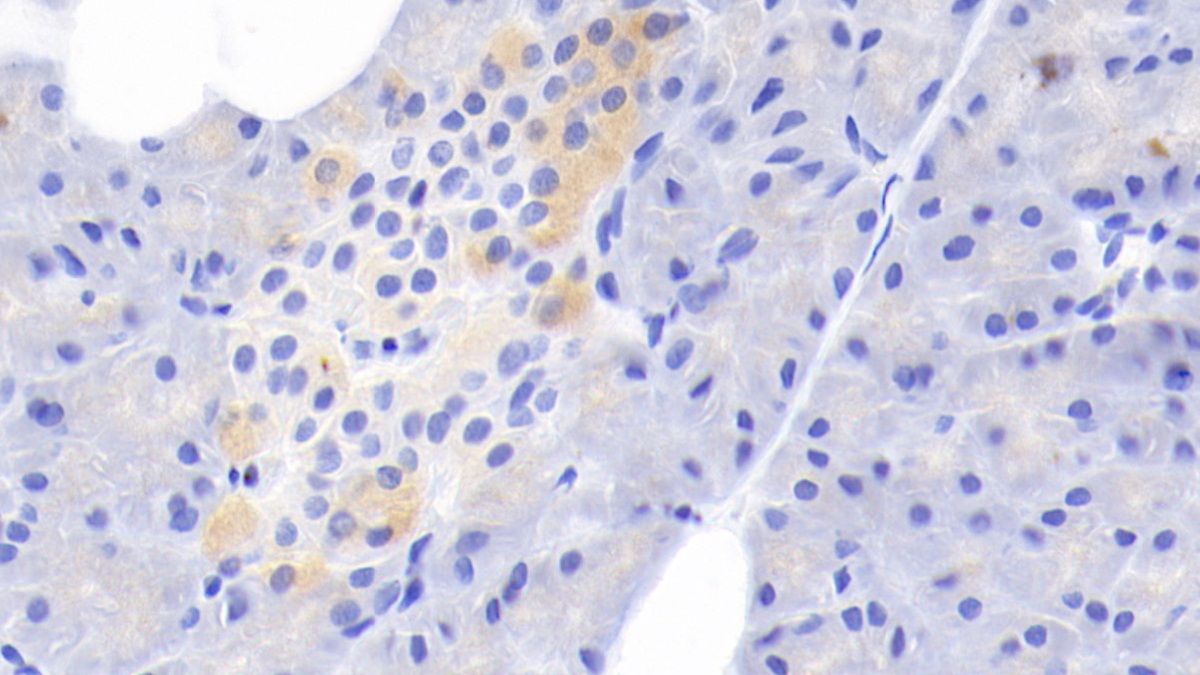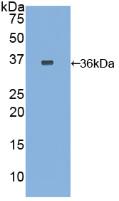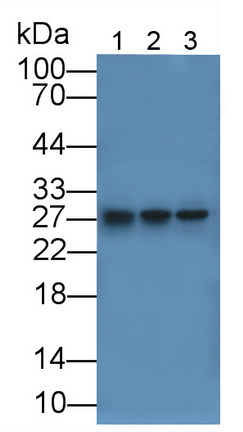Polyclonal Antibody to Tissue Factor (TF) 

CD142; FIII; F3; TFA; Thromboplastin; Coagulation Factor III
Overview
Properties
- Product No.PAA524Rb51
- Organism SpeciesOryctolagus cuniculus (Rabbit) Same name, Different species.
- ApplicationsWB; IHC
If the antibody is used in flow cytometry, please check FCM antibodies.
Research use only - DownloadInstruction Manual
- CategoryHematologyCardiovascular biology
- SourcePolyclonal antibody preparation, Host Guinea pig
- Ig Type IgG, Potency n/a
- PurificationAntigen-specific affinity chromatography followed by Protein A affinity chromatography
- LabelAPC
- Immunogen RPA524Rb01-Recombinant Tissue Factor (TF)
- Buffer Formulation0.01M PBS, pH7.4, containing 0.05% Proclin-300, 50% glycerol.
- TraitsLiquid, Concentration 500µg/mL
Sign into your account
Share a new citation as an author
Upload your experimental result
Review

Contact us
Please fill in the blank.
Specifity
The antibody is a cavia polyclonal antibody raised against TF. It has been selected for its ability to recognize TF in immunohistochemical staining and western blotting.
Usage
Western blotting: 0.5-2µg/mL
Immunohistochemistry: 5-20µg/mL
Immunocytochemistry: 5-20µg/mL
Optimal working dilutions must be determined by end user.
Storage
Store at 4°C for frequent use. Stored at -20°C in a manual defrost freezer for two year without detectable loss of activity. Avoid repeated freeze-thaw cycles.
Stability
The thermal stability is described by the loss rate. The loss rate was determined by accelerated thermal degradation test, that is, incubate the protein at 37°C for 48h, and no obvious degradation and precipitation were observed. The loss rate is less than 5% within the expiration date under appropriate storage condition.
Giveaways
Increment services
-
 Antibody Labeling Customized Service
Antibody Labeling Customized Service
-
 Protein A/G Purification Column
Protein A/G Purification Column
-
 Staining Solution for Cells and Tissue
Staining Solution for Cells and Tissue
-
 Positive Control for Antibody
Positive Control for Antibody
-
 Tissue/Sections Customized Service
Tissue/Sections Customized Service
-
 Phosphorylated Antibody Customized Service
Phosphorylated Antibody Customized Service
-
 Western Blot (WB) Experiment Service
Western Blot (WB) Experiment Service
-
 Immunohistochemistry (IHC) Experiment Service
Immunohistochemistry (IHC) Experiment Service
-
 Immunocytochemistry (ICC) Experiment Service
Immunocytochemistry (ICC) Experiment Service
-
 Flow Cytometry (FCM) Experiment Service
Flow Cytometry (FCM) Experiment Service
-
 Immunoprecipitation (IP) Experiment Service
Immunoprecipitation (IP) Experiment Service
-
 Immunofluorescence (IF) Experiment Service
Immunofluorescence (IF) Experiment Service
-
 Buffer
Buffer
-
 DAB Chromogen Kit
DAB Chromogen Kit
-
 SABC Kit
SABC Kit
-
 Long-arm Biotin Labeling Kit
Long-arm Biotin Labeling Kit
-
 Real Time PCR Experimental Service
Real Time PCR Experimental Service
Citations
- Calcitonin gene-related peptide-mediated antihypertensive and anti-platelet effects by rutaecarpine in spontaneously hypertensive ratsPubMed: 18625276
- Increased plasma level of asymmetric dimethylarginine in hypertensive rats facilitates platelet aggregation: role of plasma tissue factorNrcresearchpress: y10-115
- Ruscogenin attenuates monocrotaline-induced pulmonary hypertension in ratsPubmed: 23538027
- Endothelial gene expression and molecular changes in response to radiosurgery in in vitro and in vivo models of cerebral arteriovenous malformationsPubmed: 24199192
- Sphingolipid Pathway Regulates Innate Immune Responses at the Fetomaternal Interface during PregnancyPubmed:25505239
- Thrombosis in Hemodialysis Patients; Their Association with Tissue Factor and Tissue Factor Pathway InhibitorPubMed: 20011089
- Noble-Collip Drum Trauma Induces Disseminated Intravascular Coagulation But Not Acute Coagulopathy of Trauma-ShockPubMed: 25423126
- Ex vivo simulation of cardiopulmonary bypass with human blood for hemocompatibility testingPubMed: 26243277
- Trans‐fatty acid promotes thrombus formation in mice by aggravating antithrombogenic endothelial functions via Toll‐like receptorsPubMed: 25546502
- The effects of polysaccharides from the root of Angelica sinensis on tumor growth and iron metabolism in H22-bearing micePubmed:26757699
- Nebulized Heparin Attenuates Pulmonary Coagulopathy and Inflammation through Alveolar Macrophages in a Rat Model of Acute Lung Injurypubmed:29202212
- Nebulized anti-coagulants as a therapy for acute lung injury and acute respiratory distress syndromePubmed: 29202212
- Effects of nebulized antithrombin and heparin on inflammatory and coagulation alterations in an acute lung injury model in ratsPubmed: 31755229
- Amelioration of Coagulation Disorders and Inflammation by Hydrogen-Rich Solution Reduces Intestinal Ischemia/Reperfusion Injury in Rats through NF-κB …Pubmed: 32587471
- Effect of Glucocorticoid Administration in Intravenous Pulses on Selected Parameters of the Coagulation SystemPubmed:35685509








